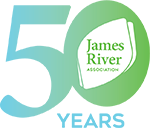As winter approaches and trees let go of the leaves still clinging to them, you may be tempted to reach for your rake or leaf blower to tidy them up. However, did you know that a variety of wildlife species depend on fallen leaves, twigs, dried stems, and grasses to survive during the colder months? In addition to benefiting wildlife, leaves contribute to soil health by acting as a natural fertilizer. You can help support local wildlife, including insects, amphibians, birds, and small mammals and improve the health of the soil in your yard – simply by leaving leaves where they fall!
Many wildlife species live in or rely on the leaf litter in our yards. For example, the insects that find refuge among leaf litter in the fall become a vital food source for birds. This is especially important in the fall and winter months when other food sources are scarce. By providing a habitat for insects, you are also supporting bird species including the Hermit thrush (Catharus guttatus) and the White-throated sparrow (Zonotrichia albicollis).

Fallen leaves also benefit soil health. As they decompose, leaves act as a natural fertilizer. Nutrients including carbon, nitrogen, phosphorus, and potassium are released into the soil, enriching it and promoting healthier plant growth. Leaf litter also acts as a mulch, helping retain moisture in the soil and protect plant roots during the cooler weather.
This fall, instead of reaching for your rake or leaf blower and bagging fallen leaves, consider the following tips that can help support wildlife and improve soil health:
- Give your rake a break: Leave leaves in your yard where they fall. Not only is this the most ecologically beneficial option, it is also the least labor-intensive.
- Use leaves as mulch: Manage leaves by raking them into designated areas in your yard where they can provide habitat for wildlife and breakdown. Consider using them as mulch in gardens and landscapes or composting them.
- Mulch leaves: If using leaves as mulch or composting them are not options, consider using a lawn mower to mulch them. Mulching leaves will clear them from your yard and help them break down faster, thereby returning nutrients to the soil.
Join the James River Association’s River Hero Homes program!
River Hero Homes is a community of stewards that realize the first step to a cleaner James River starts at home. Residents of the James River’s 10,000 square-mile watershed take a pledge and commit to adopting a minimum of three of the five following river-friendly conservation actions that reduce stormwater runoff.
- Scoop the poop. Pick up pet waste to prevent bacteria pollution.
- Use native plants. Use regionally native plants and remove invasive plants in gardens and landscapes.
- Reduce herbicide and pesticide use. Reduce or eliminate herbicide and pesticide use to promote a healthy ecosystem.
- Reduce fertilizer use. Reduce or eliminate fertilizer use to reduce nutrient pollution entering our waterways and encourage healthy soil by using compost.
- Conserve water. Reduce household water use and install a rain barrel to harvest rainwater for watering needs if possible.
Click here for more information about River Hero Homes and become a hero for the river today!
River Hero Homes would not be possible without generous support from Altria and DuPont Clear into the Future. Their support allows us to promote conservation and stewardship practices that support a healthy James River.

